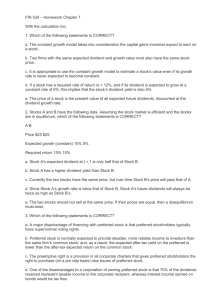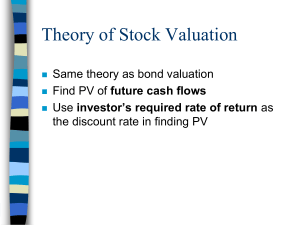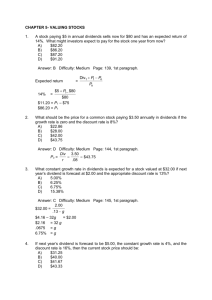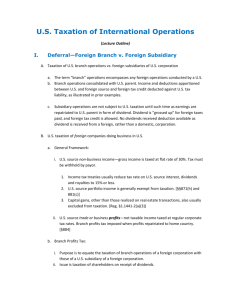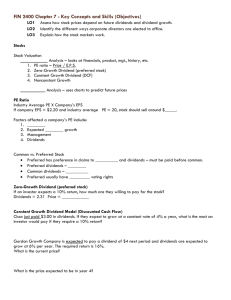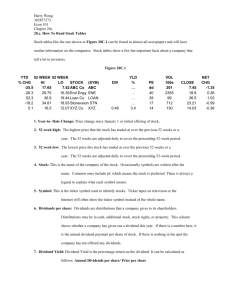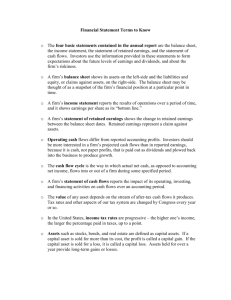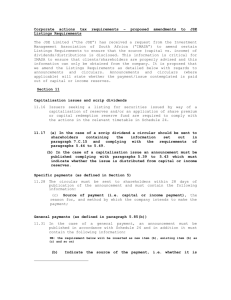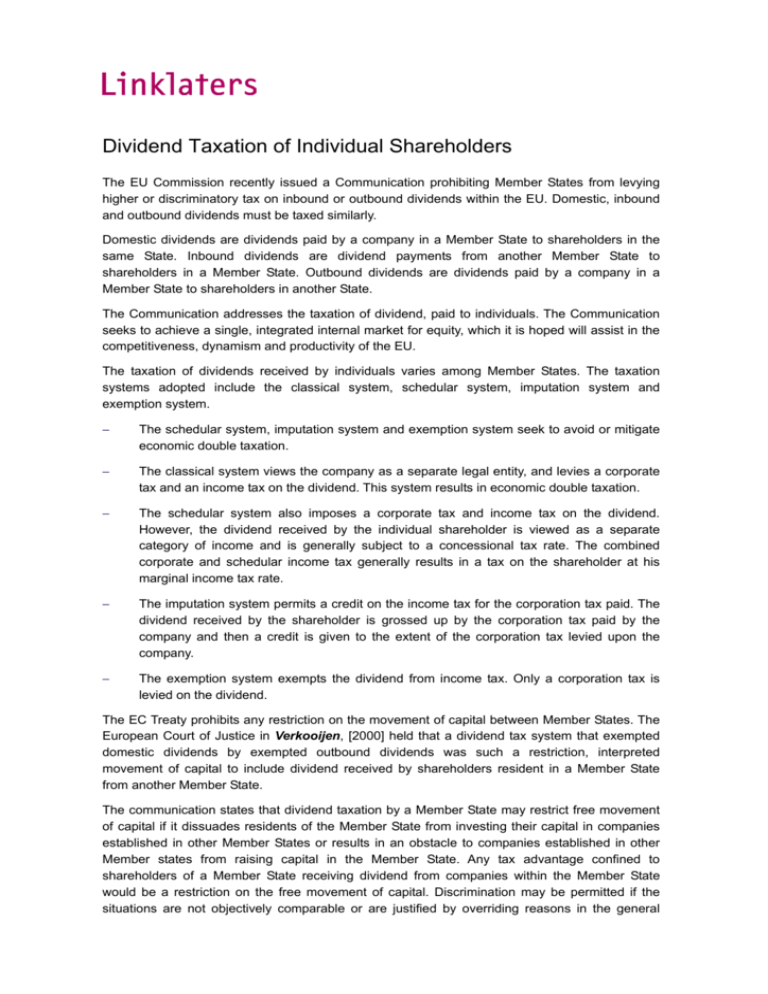
Dividend Taxation of Individual Shareholders
The EU Commission recently issued a Communication prohibiting Member States from levying
higher or discriminatory tax on inbound or outbound dividends within the EU. Domestic, inbound
and outbound dividends must be taxed similarly.
Domestic dividends are dividends paid by a company in a Member State to shareholders in the
same State. Inbound dividends are dividend payments from another Member State to
shareholders in a Member State. Outbound dividends are dividends paid by a company in a
Member State to shareholders in another State.
The Communication addresses the taxation of dividend, paid to individuals. The Communication
seeks to achieve a single, integrated internal market for equity, which it is hoped will assist in the
competitiveness, dynamism and productivity of the EU.
The taxation of dividends received by individuals varies among Member States. The taxation
systems adopted include the classical system, schedular system, imputation system and
exemption system.
−
The schedular system, imputation system and exemption system seek to avoid or mitigate
economic double taxation.
−
The classical system views the company as a separate legal entity, and levies a corporate
tax and an income tax on the dividend. This system results in economic double taxation.
−
The schedular system also imposes a corporate tax and income tax on the dividend.
However, the dividend received by the individual shareholder is viewed as a separate
category of income and is generally subject to a concessional tax rate. The combined
corporate and schedular income tax generally results in a tax on the shareholder at his
marginal income tax rate.
−
The imputation system permits a credit on the income tax for the corporation tax paid. The
dividend received by the shareholder is grossed up by the corporation tax paid by the
company and then a credit is given to the extent of the corporation tax levied upon the
company.
−
The exemption system exempts the dividend from income tax. Only a corporation tax is
levied on the dividend.
The EC Treaty prohibits any restriction on the movement of capital between Member States. The
European Court of Justice in Verkooijen, [2000] held that a dividend tax system that exempted
domestic dividends by exempted outbound dividends was such a restriction, interpreted
movement of capital to include dividend received by shareholders resident in a Member State
from another Member State.
The communication states that dividend taxation by a Member State may restrict free movement
of capital if it dissuades residents of the Member State from investing their capital in companies
established in other Member States or results in an obstacle to companies established in other
Member states from raising capital in the Member State. Any tax advantage confined to
shareholders of a Member State receiving dividend from companies within the Member State
would be a restriction on the free movement of capital. Discrimination may be permitted if the
situations are not objectively comparable or are justified by overriding reasons in the general
interest. The restrictions cannot be more severe than necessary to achieve the aim sought. The
risk of tax avoidance, loss of tax revenue, existence of lower tax rates in other Member States or
any tax advantage available to the recipients of inbound dividends may not be used as
justifications for discrimination.
Member States cannot tax inbound dividends at a higher rate than domestic dividends. Inbound
dividends should be subject to the same tax concessions and advantages as domestic dividends.
If methods for avoidance of economic double taxation are adopted by Member States, these must
be applied to inbound dividends as well. For example, under the imputation system credit should
also be given for inbound dividends. Member States presently do not give credit for inbound
dividends.
Steps to avoid international juridical double taxation must be applied to inbound dividends. When
a withholding tax is imposed upon outbound dividends, the Member State of the recipient
shareholder must credit the foreign withholding tax and not apply the deduction method.
Outbound dividends cannot be taxed at a higher rate than domestic dividends. A withholding tax
cannot only be levied upon outbound dividends.
This publication is intended merely to highlight issues and not to be comprehensive, nor to provide legal advice. Should
you have any questions on issues reported here or on other issues of law, please contact one of your regular contacts at
Linklaters, or contact the editor.
© Linklaters. All Rights reserved 2004
Please refer to www.linklaters.com/regulation for important information on the regulatory position of the firm.
We currently hold your contact details, which we use to send you newsletters such as this and for other marketing and
business communications.
We use your contact details for our own internal purposes only. This information is available to our offices worldwide and
to those of our associated firms.
If any of your details are incorrect or have recently changed, or if you no longer wish to receive this newsletter or other
marketing communications, please let us know by emailing us at marketing.database@linklaters.com
www.linklaters.com
2


